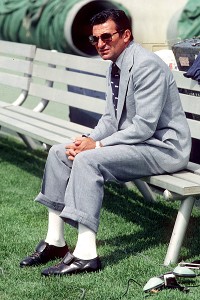
Any discussion regarding Joe Paterno was far easier a few months ago. A few days after his death, it remains difficult to comprehend how one of the least complicated men in sports left the world with such a puzzling, confounding legacy.
From now until forever, it will be impossible to separate Paterno from the Jerry Sandusky scandal. Paterno's own words -- I wish I'd done more -- are a sad, conflating addendum to a life that did much good.
Still, far too many tributes to Paterno have suggested his death is the end of some undefined age of innocence, that it closes the book on an age when grand ideals went before money or wins or expedience. That all sounds nice, but it's a fairy tale. The regurgitation of the Paterno-as-moral-messiah(-until-Sandusky) fable is what happens when people close their eyes and see the world the way they thought it was, or how they want it to be. The past few months should have taught everybody -- even the most defiant Paterno defender -- a new truth: Those ideals were either dead long ago or never existed in the first place.

Paterno was the perfect symbol of his generation. He was the guy for all the old guys, the ones who prefer solid football over flashy helmets or shiny shoes. It went deeper than football, though. He looked like the guys who worked down at the plant, and he dressed on the sidelines as if he were going to head over for 5 o'clock Mass after the game.
He didn't come from an age when men scheduled therapy sessions or retired to the woods to beat on drums and assess their self-worth. The men in Paterno's life, I'm guessing, were a lot like my father: World War II vets who did their service, came home and worked their butts off to make their kids' lives better than theirs. What they didn't do, unfortunately, was talk about it. They deflected war talk and hero talk with the same dismissive tone Paterno might use to address a reporter in a news conference.
(Men of Paterno's era kept a lot bottled inside, too, often to their detriment. This was a real world, not the smarmy, sepia-toned world proffered by maudlin nostalgia-peddlers like Tom Brokaw.)
This much seems indisputable: Paterno is the last of the Cold War coaches. His generation valued stability far more than those that have followed. Men raised in Depression and post-Depression America seemed to go about their business the same way: Get good work, be thankful for it and stick with it. Stay at the same job, with the same woman, in the same house. Don't go wandering, or getting big-headed, or thinking you're more than you are. Don't get greedy, don't take chances, don't show off. Risk is for other people.
(And if you don't see a correlation between these themes and Paterno's play calling, that'sMike Guman on line two.)
Paterno had just one publicly restless moment, and he quelled it by turning down the Patriots in 1973. Contrast that with nearly every major college coach since, with Oregon coach Chip Kelly's dalliance with Tampa Bay the latest. It never seemed to be about morefor Paterno. He had what he needed, including enough money to give away tons of it.

He was the ultimate match of man and region; central Pennsylvania is central Indiana, without the glitz. Paterno wasn't always humble -- "The Grand Experiment" was his term, remember -- but JoePa's people were.
More importantly, Paterno was the last coach of the pre-irony age. He simply wasn't built for a cynical world. It was worse than that, really: He couldn't understand it, or abide by it. All that commentating, all that know-it-all snark -- his voice would rise an octave or two, he'd swat a hand into the air. Ah, people can say what they want to say. I don't pay any attention to it. His world was direct and unfettered by doubt or -- until the last few months -- regret.
The times changed, but he didn't. He didn't know why journalists asked questions about players who acquired criminal records, and he didn't understand why compliance people at Penn State thought they should have a say in adjudicating every little transgression. This was generational, also, with more than a little brand-protection built into the equation. He could handle it himself -- what's the big deal?
Everything Paterno constructed was simple. Men of his generation dealt with their own problems their own way, which usually meant they didn't ask many questions and didn't stray too far into anybody else's business.
They kept it simple. Simple is easy, straightforward, easy to define. And every so often, simple gets complicated.

No comments:
Post a Comment